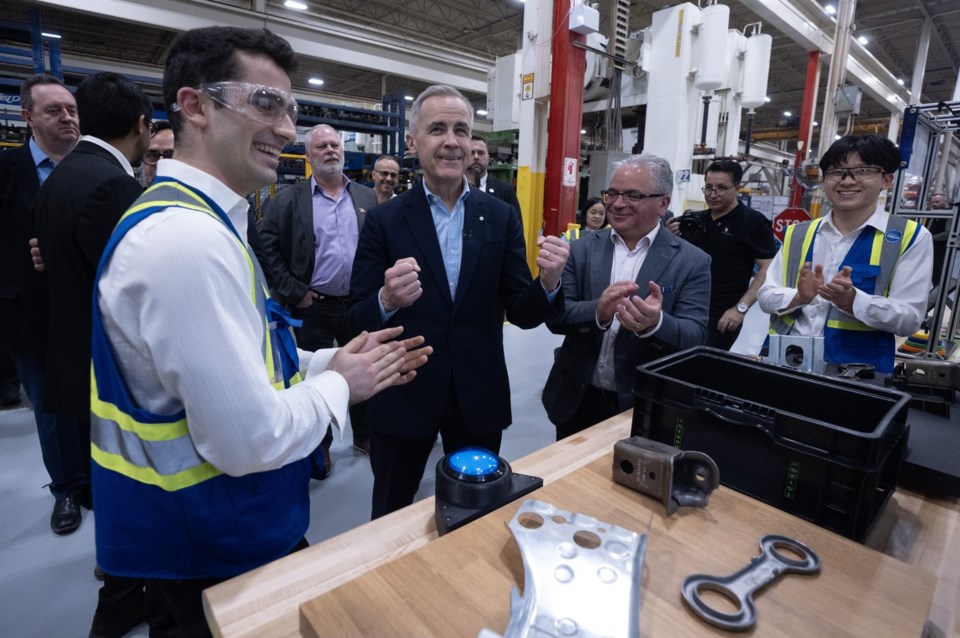OTTAWA — The head of an organization representing automakers said he's "cautiously optimistic" after meeting with Prime Minister Mark Carney to urge him to repeal the electric vehicle sales mandate.
Canadian Vehicle Manufacturers’ Association CEO Brian Kingston joined the CEOs of Ford Canada, Stellantis Canada and GM Canada in a meeting with the prime minister on Wednesday in Ottawa.
Along with discussing the impact of U.S. tariffs — the primary focus of the meeting — the automakers told Carney there's no way the industry can meet the targets set out in the EV mandate.
The industry has long argued the mandate is unnecessary since Canada already has other policies to meet its emissions-reduction targets.
"Why would you put an EV mandate on top of your existing (greenhouse gas) regulations? It makes absolutely no sense," Kingston told The Canadian Press.
"Now, what's changed since it was designed and came into force is that we've had this collapse in EV sales."
The EV sales mandate requires that 20 per cent of all new light-duty vehicles sold in Canada next year be zero-emission. The target rises annually to 100 per cent by 2035.
The most recent data from Statistics Canada shows EVs accounted for just 7.53 per cent of all new vehicles sold in Canada in April. EV sales peaked at 18.29 per cent in December, the last month before funding ran out of the popular Zero-Emission Vehicles rebate program.
Known as iZev, the rebates offered up to $5,000 off the cost of a new electric vehicle, but the program was suspended in January and that month sales dipped to 11.95 per cent.
Sales further fell to 6.8 per cent in February with the loss of the federal rebate program, and 6.53 per cent in March. They climbed slightly in April after Quebec reintroduced its own provincial rebate, which will be gradually phased out by January 2027.
"If we are going to hit the 2026 mandated target of 20 per cent EV sales, you would have to grow ZEV sales by 180,000 units," Kingston said.
"There is simply no way that that can occur on such a short timeline, given all of the current market forces at play."
While the government has indicated it plans to bring back some form of consumer rebate for electric vehicles, Kingston said making such a promise without a firm timeline for implementation promises to undermine EV sales even further.
Industry Minister MĂ©lanie Joly said in May the government was looking at bringing back "support programs" for EVs. Last month, Environment Minister Julie Dabrusin told The Canadian Press that Ottawa is working on bringing back a rebate program.
The Liberal party's election platform promised to look at ways to "reintroduce a purchase incentive worth up to $5,000."
"Comments from ministers in the public suggesting that an EV incentive is coming back are extremely damaging," Kingston said.
“If the government is going to bring it back, they’ve got to be clear about that with the plan and the timeline. And it has to be quick because if you tell people it’s going to be in three months, then no one will purchase an EV for the next three months.”
Transport Canada is holding consultations on the rebate program. Hyundai Canada CEO Steve Flamand, who has called for the rebate to return, is meeting with department officials to discuss it next week.
"For us, the program worked quite well," Flamand told The Canadian Press.
He added the sudden end of the iZEV program disrupted his company's supply chains.
"Obviously, it needs to be predictable, it needs to be stable, because our business does not shift in a matter of a couple of days," he said. "It pivots in a matter of six-month tranches."
Flamand said his company isn't opposed to the EV mandate, as long as it aligns with market demand.
"We believe in the cause, but right now I think 20 per cent... it's just not realistic. Nobody's going to do that," he said.
"So having an unrealistic mandate without the natural market demand for it is a recipe for a disaster."
Kingston said bringing back the rebate program wouldn't be enough on its own to meet the EV mandate.
"Just to give you a sense of what the cost would be if you were to try and put in place a $5,000 incentive and increase sales by an additional 180,000 vehicles to meet the 2026 target, you'd be talking about nearly a billion dollars in spending," he said.
"That is not a sustainable policy."
The government spent nearly $3 billion in five years on its EV rebates program.
This report by The Canadian Press was first published July 3, 2025.
Nick Murray, The Canadian Press



